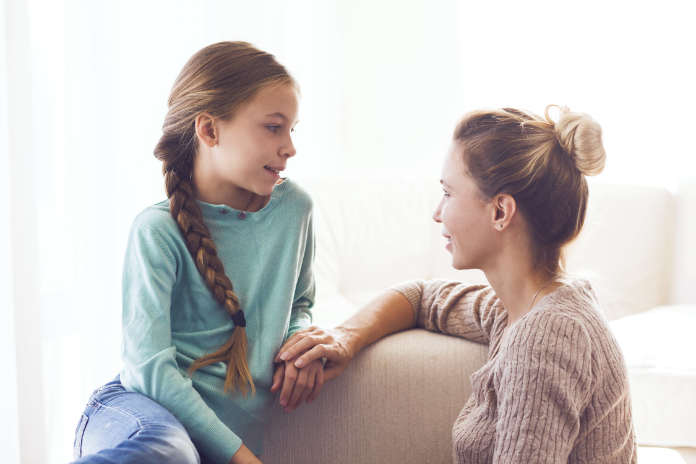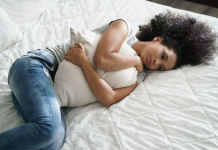After entering puberty, the body will mature rapidly and go through a lot of changes such as getting the first period. There are physical changes like the development of breasts, pubic hair, and more importantly, menstruation. Every girl starts the menstrual cycle during this phase, however, the exact time will vary based on various factors.
When should I talk about it?
Talking about periods is not one big talk at a particular age. Instead, start the conversation early and slowly build the teen’s understanding. Girls and boys need reliable information about periods. So make sure to talk with boys too.
For example, if a 10-year-old girl sees sanitary napkins or tampons and asks what is it then reply women bleed a little from the vagina every month which is normal and called a period.
Over the years, give information when children are ready to understand things and changes of the body.
What should I talk about?
If the teen doesn’t ask any questions about the period then talk about it at around 10 years of age. Look for a natural moment like –
- When teen asks about puberty or changing bodies
- If the teen asks where babies come from
- When buying pads or tampons
Ask if the teen knows about periods. Then, share basic information like, as a girl develops into a woman, body changes so can have a baby when she grows up. Part of that is getting a place ready for the baby to grow inside the mother. The place in which a baby grows is called the uterus. Every month the uterus wall prepares and gets ready for a baby. If there is no baby, the uterus wall comes off and bleeds a little or not at all. The blood comes out of a woman’s vagina. The body makes a new wall every month, just in case there is a baby.
Ques to be talked about are –
- Most girls get a period between 10-15 years old. The average age is 12 but every girl’s body has a different schedule.
- The cause of the period is hormonal changes in the body. Ovaries release estrogen and progesterone. These hormones cause the lining of the uterus to build up and get ready for fertilization of the egg to attach and start developing. If there is no fertilization of the egg, the lining breaks down and bleeds. Then the same process happens all over again. It usually takes almost a month for the lining to build up, then break down. That is why most girls and women get periods around once a month.
- Periods for the first few years may not come regularly and that is normal. By about 2-3 years after the period, a girl’s periods should be coming around once a month. The period lasts about 5-7 days but can last shorter or longer every month.
- Premenstrual syndrome (PMS) is when a girl has emotional and physical symptoms that happen before or during the period. These symptoms include moodiness, sadness, anxiety, bloating and acne and will go away after the first few days of a period.
Common facts and myths about period
- All periods do not last for 28 days
- The timing of periods depends on ovulation
- Periods can be irregular because of stress or illness
- Fluctuations in weight can affect the period
- Abnormal and irregular bleeding can indicate more serious health issues
- Irregular periods can be treated with birth control pills or other hormonal treatments
When should we consult a doctor if periods don’t come?
Most girls don’t have any problems with periods but consult the doctor if –
- Age 15 and haven’t started a period
- Started developing breasts more than 3 years ago and does not have a period
- Is more than 2 years from the first period and still do not come every 3-6 weeks
- Have severe cramps not relieved by ibuprofen
- Has very heavy bleeding
- Have severe PMS that gets in the way of everyday activities
Conclusion
Periods are natural to occur and a healthy part of a girl’s life. Talking about personal subjects such as periods can make the parent and teen feel a little uncomfortable. But reliable information is a must for a teen. Contact the doctor if periods not occur and have a problem.
References –
- talking to your child about periods (for parents) – nemours kidshealth
- 6 interesting menstruation facts and period myths – women’s care Florida (womenscarefl.com)













